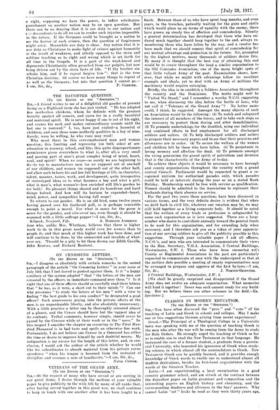THE DAUGHTER QUESTION.
[To 7RE EDITOR or tea " SPECTATOR.") Sza,—A friend writes to me of a delightful old gander at present living on a Highland farm she has just visited. " Ile has adopted five motherless chickens, whom he defends with the greatest ferocity against all comers, and cares for in a really beautiful and maternal spirit. Ile is never happy if one is out of his sight, and cranes his neck and makes extraordinary sounds until the lost one is restored." I, too, have just visited—a houseful of children, and seen those same motherly qualities in a boy of nine. Surely, were he willing, he who runs may read!
Why must there be this over-emphasized man and woman question; this limiting and repressing (on both sides) of sex- education in nursery, school, and life; this quite disproportionate prominence given everywhere to what is, after all, a very small and pausing part of man's great complex being of mind, heart, soul, and spirit? When we cease—as surely we are beginning to do—to try to manufacture men (as we suppose) out of one-half of our children, and women (as supposed) out of the other half, and allow ends to have his and her full heritage of life, in character, talent, manner, tastes, work, and development, quite irrespective e-f stereotyped ideas as to what becomes a boy and what a girl, what is man's, what woman's—how enriched will life's garden be for both ! Its pleasant things shared and its humdrum and hard things halved. And how will its horizon be expanded—heart, mind, power, and sympathies having full scope!
To return to our gander. He is an old bird, some twelve years having passed over his feathered poll, so is perhaps venerable enough to point a moral. For what is sauce for the goose is sauce for the gander, and vice-vend too, even though it should be iseasoned with a little suffrage pepper !—I am. Sir, de., Kitgask, Newport, Fife. A. MADELINE Asmeasox (one who, unlike Mrs. Whetham, believes that there is higher work to do in this great needy world even for women than to people it; and that much of this higher work has been done, and will continue to be done, by the unmarried and invalids of what- ever sex. 'Twould be a pity to let them drown our Edith Covello, John Keatses, and Richard Busters).


































 Previous page
Previous page